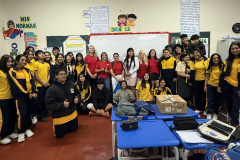Program Name: “Yo Cuido Mi Cuerpo” or “I care for my body”
Alternative Program name: Chicas Bonitas
Main Objetive
A comprehensive sexual & reproductive health (SRH) education course for adolescents in Trujillo, Peru to reduce rates of teenage pregnancy and sexually transmitted infections (STI) to be implemented in public high schools and community centers. This class does not have a cost and is open to the public.
The Problem
Teenage pregnancy is a significant public health issue in Peru. According to the latest data available from the National Institute of Statistics and Informatics (INEI) in 2020, the teenage pregnancy rate in Peru was 55.5 per 1,000 adolescent girls aged 15 to 19, one of the highest in Latin America. The high rate of teenage pregnancy in Peru is linked to various negative health outcomes for both the mother and child, including maternal mortality, low birth weight, preterm birth, and neonatal mortality. Additionally, teenage mothers may face increased risks of social and economic marginalization, reduced educational and employment opportunities, and reduced quality of life.
High rates of STIs are also a public health issue. According to the Ministry of Health, the incidence of STIs among adolescents aged 10 to 19 increased from 251 cases per 100,000 in 2017 to 310 cases per 100,000 in 2020, endangering the SRH of thousands of adolescents.
The cultural taboo around discussing sexuality has hindered the dissemination of critical health information, threatening the SRH for thousands of men and women. There is no sexual health curriculum implemented in schools. As a result, most young people are not equipped with the knowledge and skills necessary to make responsible & informed decisions about their SRH. Reducing the rate of teenage pregnancy and promoting healthy sexual behaviors in Peru requires a multifaceted approach, and it starts with comprehensive SRH education in schools.
The Solution
- Short term: Increase knowledge and awareness of sexual & reproductive health through a comprehensive SRH course that includes: reproductive health anatomy, menstrual cycles, puberty, contraceptive methods, sexually transmitted infections, connection to local resources, among other relevant topics in adolescent health like: eating disorders, bullying, & visioning.
- Medium term: Increase healthy behaviors and personal empowerment in sexual & reproductive health, increase contraceptive usage, and connection to STI testing services and other health services.
- Long term: Decrease rates of teenage pregnancy, STI’s, and empower young people in their family planning and life planning journey.
Timeline
- 2017: Program implemented in Dean Saavedra for 63 girls, supported by HOP volunteers
- 2018: Program implemented in Cesapu for 10 girls, supported by HOP volunteers
- 2019: Program implemented in Cesapu and Colegio Dean Saavedra for 30 girls
- 2022: One 1.5 hour session implemented in Colegio Republica del Mexico for 44 adolescents.
- 2023: Program implemented in Colegio Jerusalen and Cesapu for 55 girls, funding supported by Quinnipiac University School of Medicine.
- 2024: 3 sessions implemented in thanks to 3 MPH Practicum students
- 2025: 4 sessions implemented for 120 adolescents, thanks to Jazmine Abril, med student from University of Utah
Partners
Funding & Implementation Partners:
- HOP Volunteers (2018-2022) & Diana de la Cruz, R.N. M.D.
- Netter School of Medicine: Quinnipiac University School of Medicine Alexandra Whicker (2023)
Local Partners & worksites:
- Colegio Republica del Mexico
- Colegio IE Santa Maria de la Esperanza
- Instituto San Luis
Impact
The average knowledge increase before and after this 3 session educational program has been an average of 75%.
Team
- Katie Baric, MPH
- Diana de la Cruz, MD, MPH, RN


